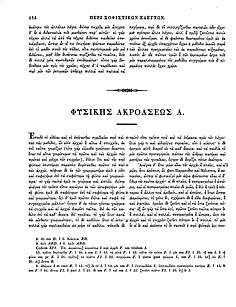Corpus Aristotelicum
 |
| Part of a series on the |
| Corpus Aristotelicum |
|---|
| Logic (Organon) |
| Natural philosophy (physics) |
| Metaphysics |
|
|
| Spurious works |
| Aristotelianism |
|---|
 |
|
Overview |
|
Ideas and interests |
|
| Philosophy portal |

The Corpus Aristotelicum is the collection of Aristotle's works that have survived from antiquity through Medieval manuscript transmission. These texts, as opposed to Aristotle's lost works, are technical philosophical treatises from within Aristotle's school. Reference to them is made according to the organization of Immanuel Bekker's nineteenth-century edition, which in turn is based on ancient classifications of these works.
Overview of the extant works
The extant works of Aristotle are broken down according to the five categories in the Corpus Aristotelicum. Not all of these works are considered genuine, but differ with respect to their connection to Aristotle, his associates and his views. Some are regarded by most scholars as products of Aristotle's "school" and compiled under his direction or supervision. (The Constitution of Athens, the only major modern addition to the Corpus Aristotelicum, has also been so regarded.) Other works, such as On Colors may have been products of Aristotle's successors at the Lyceum, e.g., Theophrastus and Strato of Lampsacus. Still others acquired Aristotle's name through similarities in doctrine or content, such as the De Plantis, possibly by Nicolaus of Damascus. A final category, omitted here, includes medieval palmistries, astrological and magical texts whose connection to Aristotle is purely fanciful and self-promotional.
In several of the treatises, there are references to other works in the corpus. Based on such references, some scholars have suggested a possible chronological order for a number of Aristotle's writings. W.D. Ross, for instance, suggested the following broad chronology (which of course leaves out much): Categories, Topics, Sophistici Elenchi, Analytics, Metaphysics Δ, the physical works, the Ethics, and the rest of the Metaphysics.[1] Many modern scholars, however, based simply on lack of evidence, are skeptical of such attempts to determine the chronological order of Aristotle's writings.[2]
Exoteric and esoteric
According to House (1956), The Poetics, is an esoteric work in this sense.[3]
Bekker numbers
Bekker numbers, the standard form of reference to works in the Corpus Aristotelicum, are based on the page numbers used in the Prussian Academy of Sciences edition of the complete works of Aristotle (Aristotelis Opera edidit Academia Regia Borussica, Berlin, 1831–1870). They take their name from the editor of that edition, the classical philologist August Immanuel Bekker (1785–1871).
Aristotle's works by Bekker numbers
The following list is complete. The titles are given in accordance with the standard set by the Revised Oxford Translation.[4] Latin titles, still often used by scholars, are also given.
Aristotelian works lacking Bekker numbers
Constitution of the Athenians
The Constitution of the Athenians (or Athenaiōn Politeia) was not included in Bekker's edition, because it was first edited in 1891 from papyrus rolls acquired in 1890 by the British Museum. The standard reference to it is by section (and subsection) numbers.
Fragments
Surviving fragments of the many lost works of Aristotle were included in the fifth volume of Bekker's edition, edited by Valentin Rose. These are not cited by Bekker numbers, however, but according to fragment numbers. Rose's first edition of the fragments of Aristotle was Aristoteles Pseudepigraphus (1863). As the title suggests, Rose considered these all to be spurious. The numeration of the fragments in a revised edition by Rose, published in the Teubner series, Aristotelis qui ferebantur librorum fragmenta, Leipzig, 1886, is still commonly used (indicated by R3), although there is a more current edition with a different numeration by Olof Gigon (published in 1987 as a new vol. 3 in Walter de Gruyter's reprint of the Bekker edition), and a new de Gruyter edition by Eckart Schütrumpf is in preparation.[5]
For a selection of the fragments in English translation, see W.D. Ross, Select Fragments (Oxford 1952), and Jonathan Barnes (ed.), The Complete Works of Aristotle: The Revised Oxford Translation, vol. 2, Princeton 1984, pp. 2384–2465.
The works surviving only in fragments include the dialogues On Philosophy (or On the Good), Eudemus (or On the Soul), On Justice, and On Good Birth. The possibly spurious work, On Ideas survives in quotations by Alexander of Aphrodisias in his commentary on Aristotle's Metaphysics. For the dialogues, see also the editions of Richard Rudolf Walzer, Aristotelis Dialogorum fragmenta, in usum scholarum (Florence 1934), and Renato Laurenti, Aristotele: I frammenti dei dialoghi (2 vols.), Naples: Luigi Loffredo, 1987.
Protrepticus
Protrepticus fragments, available in a new translation (2015) by Hutchinson and Johnson.[6]
References
- ↑ W. D. Ross, Aristotle's Metaphysics (1953), vol. 1, p. lxxxii. By the "physical works", Ross means the Physics, On the Heavens, On Generation and Corruption, and the Meteorology; see Ross, Aristotle's Physics (1936), p. 3.
- ↑ E.g., Jonathan Barnes, "Life and Work" in The Cambridge Companion to Aristotle (1995), pp. 18-22.
- ↑ Humphry House (1956). Aristotles Poetics. p. 36.
- ↑ The Complete Works of Aristotle, edited by Jonathan Barnes, 2 vols., Princeton University Press, 1984.
- ↑ "CU-Boulder Expert Wins $75,000 Award For Research On Aristotle," University of Colorado Office of News Services, December 14, 2005.
- ↑ D. S. Hutchinson and Monte Ransome Johnson (25 January 2015). "New Reconstruction, includes Greek text".
External links
| Wikisource has original text related to this article: |
| Greek Wikisource has original text related to this article: |
- The Ancient Catalogues of Aristotle's Writings. A Survey of Current Research
- The Rediscovery of the Corpus Aristotelicum with an annotated bibliography
- Bekker's Prussian Academy of Sciences edition of the complete works of Aristotle at Archive.org
- Lazaris, S. "L’image paradigmatique: des 'Schémas anatomiques' d’Aristote au 'De materia medica' de Dioscoride", Pallas, 93 (2013), p. 131-164 ext. link
- Oxford Translation of The Works of Aristotle at Archive.org (contents by volume)